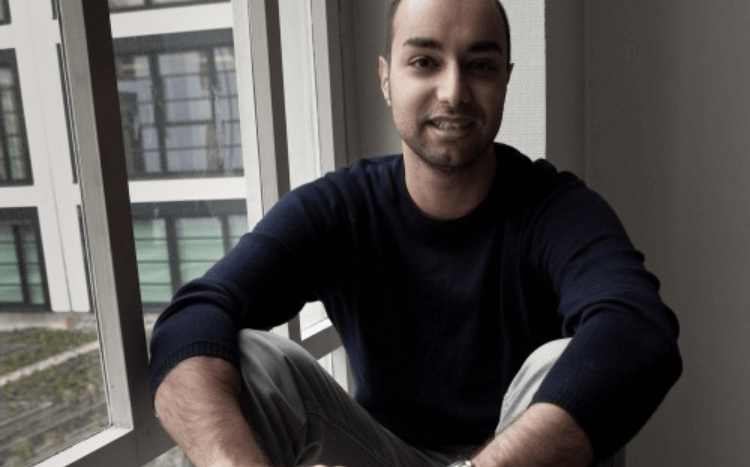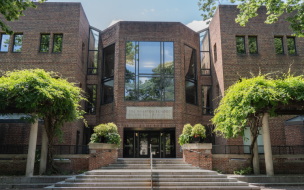BusinessBecause met Madisch, 31, at ResearchGate’s offices in downtown Berlin last week. He arrived a little late for our interview (he was working late the night before). Over six feet tall, energetic and full of beans, he got right down to work telling us the story of how ResearchGate got started, its latest funding round and his vision for the future of a site that now boasts 1.4 million members.
Back in 2008 Madisch was doing a Phd in Virology at Harvard University. His research ran into difficulties and in order to move it forward he needed answers from other scientists working in the same area. But it was practically impossible to find them – they could be anywhere in the world! “I couldn’t even contact scientists in the next door lab!” he said.
The hyperactive Madisch, who earned an MD and a BSc Computer Science from Hannover University before heading to the US, called up two of his best friends back in Germany: physician Sören Hofmayer and computer scientist Horst Fickenscher.
He had an idea for a networking site for scientists, which would make it easier for them to share ideas, discuss experiments, ask questions and even publish papers.
Scientific research is typically a long and secretive process. The ultimate goal for researchers is to have their results published in a peer-reviewed journal, available only at institutions that can afford the subscriptions.
There’s also the issue of “negative results”, which account for 80 per cent of results, says Madisch. “When you don’t find anything, you don’t want to share that,” but this knowledge would save time for other researchers.
His friends agreed and together they got to work on the site. Initially they had no outside funding, though another friend of Madisch’s – Sebastian Darr - invested his €20,000 euro life savings in a "family and friends" round (the best investment he’s ever made, says Madisch). They couldn’t pay their small team of web coders, but offered them equity in the company instead.
ResearchGate grew rapidly following its launch. Within two years, 300,000 scientists had joined the site and were using it to share knowledge, ask questions and discuss experiments. But during this period the company almost shut down a few times, when it ran out of money.
It wasn’t smooth sailing for Madisch personally, either. He was due to return to Germany to start his medical residency, but his supervisor in Hannover wouldn’t let him do it part-time whilst working on ResearchGate.
Madisch comes from a family of doctors, and they thought he was nuts. Both his father, who migrated to Germany from Syria 40 years ago, and his older brother are in the profession. His brother advised him to stick to medicine and become a professor.
Instead, Madisch found a supervisor at Harvard who was happy for him to do a medical residency there part-time, so ResearchGate was launched out of Harvard’s community of scientists.
It’s important to Madisch that ResearchGate is a community for scientists, built by scientists. They’re constantly making improvements and changes based on feedback from their members, and what’s happening in the science world.
He says he was “always afraid of VCs”, as he didn’t want to commercialise ResearchGate. He was approached by many, but, “They were always asking: What is the revenue model? How can we make money?” Madisch wanted to concentrate on developing a ground-breaking product that would fundamentally speed up the process of scientific discovery.
In mid-2010, on the last day of a trip to San Francisco, he got a call from Matt Cohler, the 34-year-old billionaire who was in the founding teams of LinkedIn and Facebook, and is now General Partner at Benchmark Capital, one of Silicon Valley’s most successful VC funds. “Matt who?” said Madisch. “Sorry, I need to catch a flight, I don’t have time.”
Luckily he spoke to one of his friends, who urged him to call Cohler right back. They met, and Madisch finally found the VC investor he’d been looking for. “He asked me about my vision for ResearchGate, and I said I wanted it to win the Nobel Prize.”
Benchmark Capital came on board in September 2010 along with Silicon Valley heavyweights Accel Partners, Michael Birch (founder of bebo) and David O. Sacks, and UK tech guru Simon Levene. They agreed with Madisch that the focus has to be on the technology, the users and the quality of the product.
This week ResearchGate closed a second funding round, led by Founders Fund partner and PayPal co-founder Luke Nosek.
Its achievements to date are pretty spectacular. In addition to housing four million papers, members can use ResearchGate to search 40 million abstracts and papers from other science databases. In 2011 the network saw 1,620,849 connections were made, 12,342 questions answered and 842,179 publications shared.
Madisch splits his time between Berlin, Boston and San Francisco, but the company’s HQ is firmly in Berlin, where it employs close to 70 people. “The coders here are a lot cheaper and not as spoiled,” said Madisch. He has picked up some Silicon Valley values though: all his employees have shares in the company, as well as free lunches and office treats.
As far as MBAs go, Madisch was not too keen: ResearchGate doesn’t employ any. “More than half the people on ResearchGate are natural scientists, from fields like biology, medicine, chemistry, physics and computer science. It’s hard for a non-scientist to build a product for them.” MBAs do know a lot about how to build companies, he acknowledged. “The ideal scenario would be to have an MBA who also has a Phd in science.”
With the new services that ResearchGate is set to launch over the next three or four months, Madisch is confident that the network will hit critical mass soon. Watch this space for a new era of global scientific collaboration.
RECAPTHA :
fd
30
20
83







